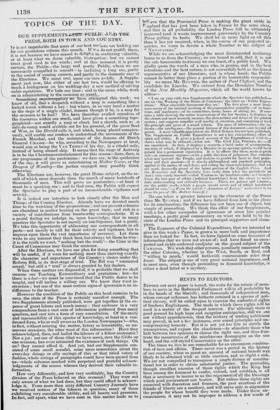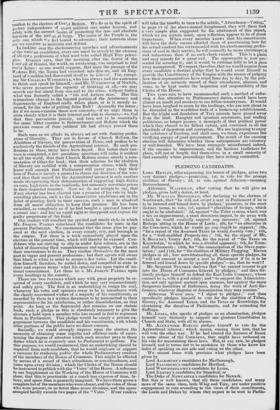HINTS TO ELECTORS.
BEFORE our next paper is issued, the writs for the return of mem- bers to serve in the Reformed Parliament will in all probability be in the hands of the Sheriffs ; and thousands of independent men, whom corrupt influence has hitherto retained in a species of poli- tical slavery, will be called upon to exercise the undoubted rights of freeborn Englishmen.. The mode in which these rights will be used is a matter of the deepest interest. For although there is good ground for high hope and sanguine anticipation, still we are not without apprehension, that the trickery of trading politicians may prevail, in not a few instances, over sound principles and un- compromising honesty. But it is not yet too late to startle the unsuspicious, and expose the charlatans—to stimulate those who halt between two opinions to choose the right one, and thus frus- trate the manoeuvres of the mischievous demagogue on the one hand, and the self-styled Conservative on the other. The times we live in are remarkable for an uncommon combina- tion of men and affairs. There never was a period in the history of our country, when so great an amount of national benefit was likely to be obtained with so little exertion, and so slight a risk. We are not compelled to transgress a single dictum of constitu- tional law in order to obtain substantial justice. The peaceable, though steadfast exercise of those rights which the King has been among the foremost to confer, extend, and establish, is all that is necessary to insure to us the enjoyment of all the blessings which good government can bestow. But unless those rights are exercised with discretion and firmness, the past exertions of the friends of liberty are a mockery, and will serve only to stigmatize the people for whose benefit they were made. Under these cir- cumstances, it may not be improper to address a few words of caution to the electors of Gre 'at Britain. We do so in the spirit of perfect independence of every political sect under heaven, and solely with the earnest 7aesire of promoting the true and absolute interests of the nation of the var of all Open professions of what used tobe called High Tory princi- i are we anxious irAis candidates, every one must be struck by the absence maintain and defend. In looking over the electioneering speeches and advertisements we feel bound to advocate ; their interests alone on at large. The cause of the People is the only one which pies- GIBBON says, that the morning after the decree of the Cattr.cil of Rimini, the world, on awakening, was surprised to find itse'd Arian : so one would suppose, that since the passage of the B.eform Bill, the Tories had vanished into thin air, and all Eng- land of a sudden had discovered itself to be Liberal. For, except- ing Sir CHARLES WETHERELL, who has always had the assurance to think and speak for himself,—and Mr. WODEHOUSE of Norfolk, who never possessed the capacity of thinking at all,—we may search our fair island from one end to the other, without finding what was formerly 'called a " life and fortune man." Has this Miraculous change in the bigoted portion of the Aristocracy and Squirearchy of England really taken place, or is it merely as- sumed, for the sake of gulling John Bull ? Assuredly the latter ; for if we cross-examine these now converts,—if we urge them to state clearly what it is their interest and aim to obscure,—we find that they prevaricate grossly, and turn out to be essentially the same bitter enemies to Retrenchment and Reform which the previous course of their political life had always proved them to be.
Such men as we allude to, always set out with flaming profes- sions -of liberality. They are in favour of Church Reform, the Abolition of Slavery, the preservation of Peace, and profess to be exclusively the friends of the Agricultural interest. By such pro- fessions as these, many have been duped. But before their can- vass is completed, a few searching questions will make it evident to-all the world, that their Church Reform means merely a com- mutation of tithes for land ; that their schemes for the abolition of Slavery are saddled with a compensation clause, which they know well enough that Parliament will never pass ; that their love of Peace is merely a pretext to obtain the direction of the war; and that their regard for the Agricultural interest is only another mode of expressing their determination of supporting high duties on corn, high rents to the landlords, but ruinously uncertain prices to their degraded tenantry. Now we do not scruple to say, that if any elector has been cheated into a promise of his vote by high- sounding phrases, such as the Conservative candidates are in the habit of pouring forth in their canvass, such a man is absolved from all moral obligation to keep that promise. He has been swindled, as completely as if he had bought a spavined horse for a sound one; and has an equal right to disappoint and expose the .guilty perpetrator of the fraud. Our readers will recollect the spirited and manly style in which Mr. JOSEPH PARKES catechised the candidates for seats in the present Parliament. We recommend that the same plan be pur- sued at the next election, in every county, city, and borough in the empire. For there is a trick extensively played upon the olectors at the present time, which will thereby be exposed. Can- didates who are striving to slip in under false colours, are in the habit of disowning their committeemen and agents, when it suits their convenience to do so. They confine themselves for the most part to vague and general professions; but their agents will swear that black is white in order to secure a few votes. Let the candi- date himself, therefore, be nailed down, and compelled to state in -clear and express terms what his opinions are upon topics of na- tional concernment. Let there be a Mr. JOSEPH PARKES upon -every hustings in the country. There are two PLEDGES which may with great propriety be re- ,quired of every candidate, and which he may very conscientiously and safely give. The first is an undertaking to resign his seat, whenever his votes and opinions cease to be in accordance with the clearly ascertained wishes of a majority of his constituents, as recorded by them in a written document to be transmitted to their representative for his satisfaction, or rather dissatisfaction, on that point. As long as the Septennial Act remains on our statute book, such a pledge as this is absolutely necessary to give the electors a hold upon a member who has ceased in fact to represent them in Parliament. This pledge would be simply a private en- gagement between the candidate and his constituents, with which other portions of the public have no direct concern.
Secondly, we would strongly impress upon the electors the necessity of obtaining some regular and efficient mode of ascer- taining the degree of attention which each member pays to those duties which he is expressly sent to Parliament to perform. For this purpose, we would recommend, that an undertaking should be required from each candidate, that he would originate or support a measure for rendering public the whole Parliamentary conduct of the members of the House of Commons. This might be eflbcted by means of a record of their attendance, or non-attendance, and votes upon every division ; which the Clerks of the House should -be instructed to publish with the "Votes" of the House. A reference --to our Supplement on the Working of the House of Commons will -show, that this is practicable , at a much less expense of time, la- liour, and space than is generally imagined. We have there given a :complete list of the members who were absent, and the votes of those -who were present, on no fewer than seven divisions, and the space I occupied hardly exceeds two pages of the " Votes." If our readers will take the troubit to turn to the article, " Attendance—Voting," in page 19 of Jie above-named Supplement, they will there find a very simple plan suggested for the attainment of this object, which we are certain must, upon reflection, appear to be of great importance. When every member knows that his constituents will have the daily means afforded them of ascertaining how far his actual conduct has corresponded with his electioneering profes- sions of zeal in their service, he will assuredly be more circumspe'et and industrious than if no such cheek existed. This is a plain and easy remedy for a great evil. The opportunity is now pre- sented for securing it; and it would be extreme folly to let it pass away unimproved. We repeat, therefore, that we would require from every candidate a distinct pledge that he would exert himself to provide the Constituency of the Empire with the means of judging how their representatives have acted from day to day, by the pub- lication of an accurate record of their attendance, absence, and votes, to be kept under the inspection and responsibility of the Clerks of the House.
Two years ago, to have recommended such a method of enfor- cing a due attention to Parliamentary duties, would have been almost an insult and mockery to our fellow-countrymen. It would have been laughed to scorn by the lordlings, who are now about to be discarded as the worthless tools of a broken-up establishment. But the blight and desolation of Tory misrule have passed away from the land. Haughty and ignorant aristocrats, and trading politicians, no longer possess a monopoly of that political power which they abused to its fullest extent, and exercised in all the- plenitude of despotism and corruption. We are beginning to enjoy the substance of freedom, and shall soon, we trust, experience the vivifying energy of good government. The result of the ensuing election will determine whether these anticipations are visionary or well-founded. We have been strangely misinformed indeed, if the enemies to improvement, and the factious traffickers for place, will not at length find themselves in a small minority of that assembly whose proceedings they have so long controlled.




























 Previous page
Previous page